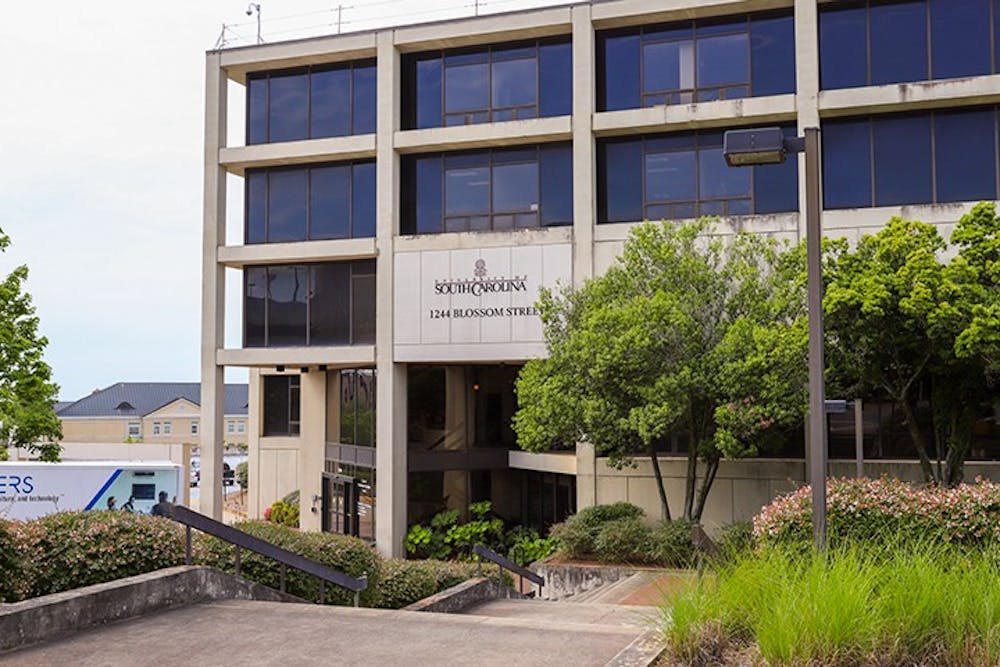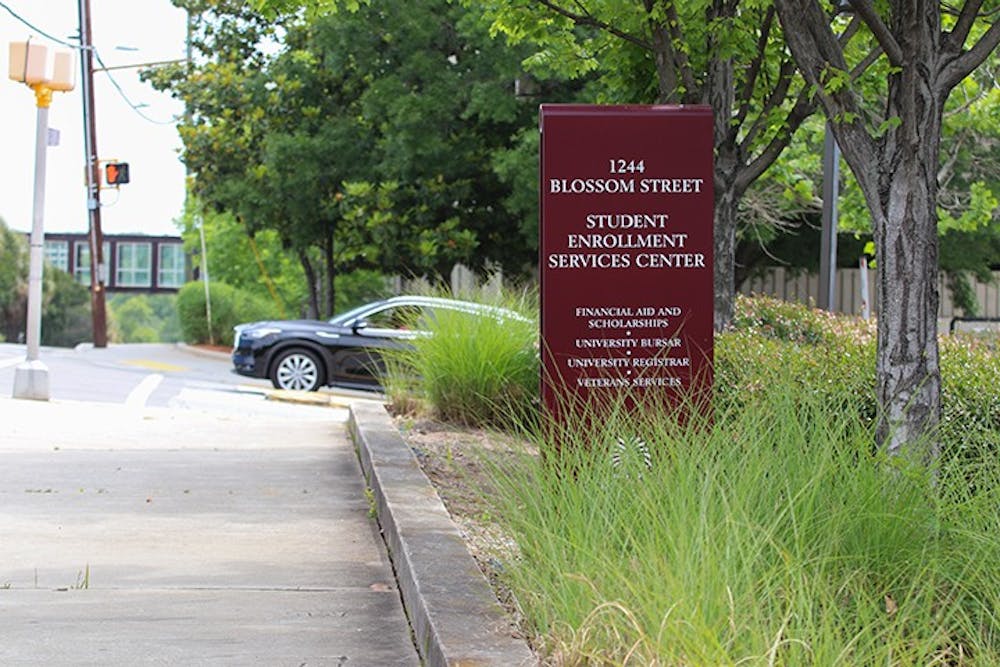— This story is current as of May 14. These policies are dependent upon the development of COVID-19.
When President Bob Caslen shared a survey in April inquiring about students’ plans for the fall, it only confirmed what the Office of Undergraduate Admissions already knew: Some students were considering taking a semester off if classes remained online.
Though the university has since announced it plans to return to in-person instruction, COVID-19 will still be a health concern during the fall semester, and campus operations are expected to change in accordance with social distancing guidelines. The student experience will be different.
Scott Verzyl, the associate vice president for enrollment management and dean of undergraduate admissions, said students often take a semester off without talking to anybody at USC in advance. As a result, they may lose scholarships or graduate later than anticipated.
If students choose to take off a major semester — spring or fall — and plan to come back, the recommended protocol is to talk to an academic advisor about how it might impact course progression, consult with financial aid to make sure scholarships and aid are not at risk of being lost and begin the re-enrollment process with the admissions office.
Office of Undergraduate Admissions
According to Verzyl, if an incoming freshman wanted to take the fall semester off, they could defer enrollment for up to a year without having to reapply, though scholarships would no longer be guaranteed.
However, if a current student is thinking about taking the fall semester off and returning in January, they would need to immediately begin the readmission process in order to stay on track for a spring return. The first step is to fill out the “Readmit/Returning Application” online through the admissions office.
The primary purpose of the application, Verzyl said, is to update personal information such as mailing address and phone number and to determine if the student will take classes at other institutions during the break so transcripts can be processed for credit at USC. This form is less involved than the admission application students filled out prior to their freshman year.
“This isn’t gonna be a process where the student has to — when people think about applying for admission to a university, they think of essays and scores and, you know, all these grades and things like that,” Mary Wagner, assistant vice president for enrollment management and executive director of admissions, said. “We’re gonna try to be as flexible as we possibly can, as well as proactive about telling students what they need to do to come back with a minimum of fuss.”
Wagner said the application is an expedited way to see who is returning so they can reactivate their records and make them eligible for advising and class registration. As of now, no changes have been made to this process in response to COVID-19, though this could change depending on how COVID-19 develops and whether many students take the fall semester off.
According to Kay Banks, the assistant dean for student affairs and diversity at the Honors College, once an honors student is readmitted into the university, they are typically also readmitted into the Honors College. No further action is required.
“We just wait to see if you are accepted through the admissions office, and then we will take [students] back with that, as long as [the leave of absence] has nothing to do with judicial or anything like interdisciplinary,” Banks said. “We do not have an application process.”
Advising
The readmission process is generally the same across the university, but some colleges have progression requirements that differ from readmission requirements. For this reason, it is necessary to consult one’s advisor before making a decision.
"If your GPA does not meet the progression requirement for your college and you stop out, they might not let you back in,” Verzyl said. “So, you need to make sure that you’re maintaining the continuing enrollment requirement, usually in terms of GPA or courses that you’re supposed to have completed by a certain point.”
Whereas the university’s policy requires a 2.0 GPA for readmission, individual colleges have varying requirements. For example, the College of Engineering and Computing requires a 2.5 GPA for readmission, and the Darla Moore School of Business requires a 3.0 GPA. It is possible a student may be readmitted into the university but not into their college.
Jed Lyons, the senior associate dean for academic affairs at the College of Engineering and Computing, said students who do not meet their college’s GPA requirement can still petition in order to be considered for readmission. Within his college, one significant consideration is that students must pass every engineering and computing class in their curriculum within two attempts. They may repeat a course if they fail their first attempt.
“If somebody’s got less than a 2.5 [GPA] and doesn’t have a repeated courses problem, then the petitions committee can consider their circumstances on why they left and consider them for readmission,” Lyons said.
Course offerings and bulletin changes can also cause problems for students looking to stay on track for graduation.
Students can take up to a three-year gap between semesters and still graduate under the bulletin that was in place when they first enrolled. If a student returns beyond that three-year period, the new bulletin will then apply to them.
Even if a student returns under the same bulletin, classes may still be added or taken away any semester, and some classes are only offered certain times of the year.
“If a student were to take fall off, for example, and the course they need to graduate might only be offered in the fall, they may really want to think about that because it might be better to try to take that class even if it’s an online capacity rather than having to wait a full year to get the class that they need,” Verzyl said.
Financial Aid
Joey Derrick, the director of financial aid and scholarships, said in an email that students should consult with

the Office of Financial Aid and Scholarships before making a decision about taking a semester off because the eligibility requirements for scholarships and aid vary.
If a current student chooses to take a leave of absence, the student is required to fill out a Deferment/Leave of Absence Request form, according to the Office of Student Financial Aid and Scholarship Deferment/Leave of Absence Policy.
The university’s current policy applies to general university scholarships and does not apply to SC State scholarships.
Verzyl said South Carolina residents who are receiving HOPE, LIFE or Palmetto Fellows scholarships essentially need to have continued enrollment — enrollment for eight consecutive semesters — to be eligible for these scholarships.
"Students must complete 30 hours a year, and if you break your enrollment, it's very difficult to make those hours up and remain eligible for the scholarship," Verzyl said.
A scholarship deferment will automatically be approved by the Office of Student and Financial Aid and Scholarships if a student has a documented medical reason or military service, has an internship or co-op or is studying abroad without gaining academic credit.
If a student's situation is not considered under these categories, then the decision to approve or deny a student's scholarship deferment will be at the discretion of the Office of Student Financial Aid and Scholarship.
"We don't want to penalize a student for things beyond their control," Verzyl said.

According to Verzyl, there is an internal team that reviews scholarship deferments and transfers, and some go before the financial aid committee. Decisions regarding deferment requests for the fall semester will be reviewed when more details about the fall semester are decided.
For incoming freshmen, the approval of deferment of scholarships will be decided at the discretion of the Office of Undergraduate Admissions.
Scholarships are also contingent on fund availability.
Donors, the state, institutional funds and revenue from auxiliaries like athletics are some of the sources that fund scholarships.
“If the source of those funds goes away, then our first thing we would do is try to find other sources of funding, if we can, to honor the scholarship commitments we’ve already made, and so far we’ve always been able to do that," Verzyl said.
When a student accepts financial aid, they agree to a clause that says even though they qualify for a scholarship, if the university does not have the ability to fund the scholarship, then it cannot be awarded.

